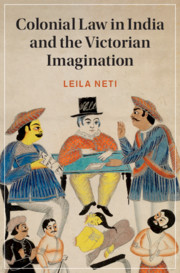Book contents
- Colonial Law in India and the Victorian Imagination
- Cambridge Studies in Nineteenth-Century Literature and Culture
- Colonial Law in India and the Victorian Imagination
- Copyright page
- Dedication
- Contents
- Acknowledgments
- Introduction
- Part I Criminality
- Part II Temporality
- Chapter 3 Injurious Pasts
- Chapter 4 On Time
- Part III Adoption and Inheritance
- Afterword
- Notes
- Bibliography
- Index
Chapter 4 - On Time
How Fiction Writes History in Wilkie Collins’s The Moonstone
from Part II - Temporality
Published online by Cambridge University Press: 02 April 2021
- Colonial Law in India and the Victorian Imagination
- Cambridge Studies in Nineteenth-Century Literature and Culture
- Colonial Law in India and the Victorian Imagination
- Copyright page
- Dedication
- Contents
- Acknowledgments
- Introduction
- Part I Criminality
- Part II Temporality
- Chapter 3 Injurious Pasts
- Chapter 4 On Time
- Part III Adoption and Inheritance
- Afterword
- Notes
- Bibliography
- Index
Summary
“On Time: How Fiction Writes History in Wilkie Collins’s The Moonstone,” shows how the novel subtly reinforces the principles put forth in the judicial opinion. Written just five years after Ramaswamy Aiyan v. Venkata Achari was decided by the Privy Council, The Moonstone reflects many similar concerns with centering English modernity, especially by way of comparison with colonies such as India. I show how the novel invokes oppositional teleologies for India and Britain, often playing up sectarian tensions and Brahminism in the Indian context. As the narrative of the mystery moves steadily forward, reflecting the teleology of British progress, the temporality of India remains stubbornly stagnant. Finally, folding the present into the past, the gem, the deity, and the devotees end up exactly where they began, oblivious to the linear narrative of history and impervious to the forward movement of time. More specifically, the novel’s mystery genre works to naturalize a teleological narrative of history that solidifies the relationship between the restorative British present and the stalled Indian past. As the mystery unfolds, it becomes increasingly clear that the temporality of the novel is intimately related to the teleology of a colonialist vision of history.
Keywords
- Type
- Chapter
- Information
- Colonial Law in India and the Victorian Imagination , pp. 122 - 146Publisher: Cambridge University PressPrint publication year: 2021

